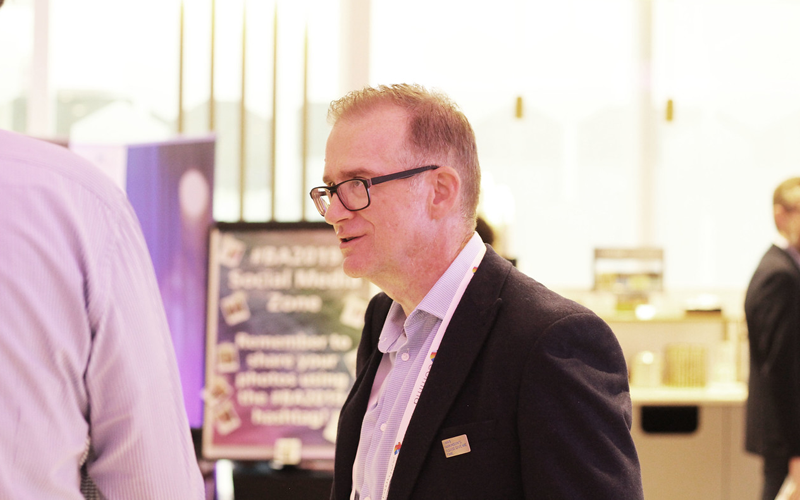This article in my series on Presentation Skills I am going to look at something that all presenters have to face and overcome… I’m talking about nerves, stress, the heebie-jeebies, butterflies, panic and self-doubt to name a few of its manifestations.

David Beckham, Principal Consultant, ChuDo Consulting
David has spoken regularly at the annual Business Analysis Conference Europe. View more information on this year’s Business Analysis Conference Europe 2020, which takes place 21-23 September 2020 in London. David is a member of the BA Conference Europe 2020 Advisory Board.
This article was previously published here.
View the previous entries in this blog series: Part 1, Part 2, Part 3, Part 4, Part 5
I’m going to start by saying something that may be a surprise to the less experienced speaker; Don’t waste time trying to get rid of all your nerves, it just won’t ever happen! Mark Twain once said there are only two types of speaker; a) the nervous and b) liars! I have yet to meet a speaker who I consider to be a good one that isn’t nervous before speaking. In fact, most of us agree that a little bit of nerves are actually a good thing as they keep you sharp and also remind you to respect the occasion. Therefore the trick is not to eliminate anxiety but to manage it positively. The following are ways I do this; it is not an exhaustive list and other speakers would have other suggestions but these work for me. So, in no specific order here they are:
Eliminate ambiguity – for me this is a real big one. If you can eliminate enough elements of ambiguity about your session it will really help. Here are some of my methods…
- Check the venue out beforehand: If you can, get a look at the venue early so that you get an idea of the size of the room, where the screen is and how much room you will have etc. This really helps on the day as you will not be surprised and also, if you spot an issue during your reconnaissance you have more time to get it fixed. If possible check your IT kit compatibility in advance as well; this will hopefully help you avoid the ‘Curse of the Incorrect Laptop Adaptor’ and other such maladies. Additionally, on the day of your event make sure you get to the room in plenty of time in order to set up or accept the hand-over from the previous speaker depending on the agenda.
- Make friends with the people who can help you in the event of problems: These people include the organisers, the venue/room IT technician, the room host (at most conferences the organisers will have people in each room to help resolve problems and if required, to carry a roving microphone for questions). DO NOT, IN ANY CIRCUMSTANCES, P*SS OFF ANY OF THESE PEOPLE. They are lovely friends to have when things go right, and even lovelier to have when the doo-doo hits the air dispersal device.
- Anticipate what could happen to make said doo-doo hit said air dispersal device: it’s a helpful thing to do prior to speaking to briefly spend some time on things that might go wrong, with two caveats a) don’t linger too log on it and b) keep it reasonable. Worrying about an asteroid strike during your talk is probably a step too far but considering what might happen if your laptop runs out of charge is a possibility. Oh, and once you’ve identified the list of potential banana skins then please, please, please put together a mitigation plan!
- Anticipate the questions you might get asked and in addition, rehearse your answers! This can really help when you are faced with a question. If you’ve already anticipated it then you won’t be thrown. In fact you may greet it with “Ah, now I’m really glad you asked me that!”
Set yourself up to succeed – it’s important that you avoid undermining your chances of success; in fact you want to overmine yourself as much as possible (Is that a word…?) and there are some techniques I use to do this……
- Have positive assumptions. It’s very important to go onto the stage thinking that the audience want you to succeed, because it’s very very likely they do. I don’t know many people who go to presentations thinking they’re looking forward to a complete disaster so in general you can expect a positive, supportive reception. Also put in place some assumptions about you being a success, that people will enjoy it etc and it will relieve some of the tension.
- Visualise to succeed. I am a great believer in this one. Prior to a speaking engagement I spend a considerable amount of time replaying successful previous events in my mind. I put a lot of detail into this, recalling the atmosphere, the audience and my feelings as I realised I was absolutely nailing it. I have also created several powerpoint animations that I can watch to get me into the zone and several playlists of inspiring music to listen to.
- Own the room. Many people are intimidated by the thought of a big room full of people looking a them. The way I have taught myself to think about it is that the audience are guests in my domain; this is my turf and I own it for the duration of the presentation. I extend my personality to embrace them all…..!
- Make eye contact. Remember the shark in ‘Jaws’? It was much more frightening before you saw it wasn’t it? Once you saw it you thought “Oh, it’s a rubber shark”….. It’s the same with the audience. Look at them and they seem a lot less scary. Just don’t look exclusively at the most apparently friendly face as that soon gets a bit weird; for them and the rest of the audience…..
So there we go, there’s a few notes from my play-book. I’ve no doubt missed out quite a few and other speakers out there reading this may be thinking “what about X??” or “Surely he must consider Y??” but that’s the joy of being a speaker, you learn as you go!!
David Beckham has spent his career working at Aviva and has been a Business Analyst in different guises since the mid-90’s. He was a founder member of the Business Analysis Practice when it was formed within Aviva IT and has had two terms as the Practice Lead. He has worked on numerous large change programmes and has been heavily involved in building the capability of Business Analysis within his organisation over the last few years. He has presented at the European BA Conference on a regular basis and has had several articles on Business Analysis topics published through various media. Despite being diagnosed with Parkinson’s Disease in 2010 at the age of 43 David continues to relish his role as a Business Analyst and is a passionate advocate of the profession and the benefits it gives to organisations everywhere and regularly speaks on the positive power of change both on a professional and personal basis.
Copyright David Beckham, Senior Business Analyst, Aviva


